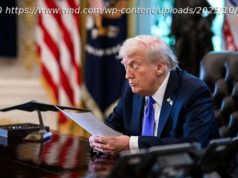« We really haven’t done that before, certainly not very much before. »
President Donald Trump said Tuesday that he will send the military to guard the border until construction on a wall is completed. But he might not be able to do that, thanks to an oft-cited 19th-century law.
During a meeting with Baltic leaders in the Cabinet Room, Trump declared his intention to work with Secretary of Defense James Mattis to temporarily secure the border. “Until we can have a wall and proper security, we’re going to be guarding our border with the military,” Trump said.
NEW: Pres. Trump: « Until we can have a wall and proper security, we’re going to be guarding our border with the military.
“That’s a big step. We really haven’t done that before.” https://t.co/ropeSGTYMc pic.twitter.com/u6IAVPAjPt
— ABC News Politics (@ABCPolitics) April 3,2018
“That’s a big step,” Trump added. “We really haven’t done that before, certainly not very much before.”
Trump is correct to say it hasn’t been done much before, because the use of the military to enforce the law on domestic soil is heavily limited by the Posse Comitatus Act. The act, signed into law by former President Rutherford B. Hayes in 1878 restricts the use of the military to execute domestic law enforcement functions unless “expressly authorized by the Constitution or Act of Congress.”
That act, now enshrined into law under 18 U. S. Code § 138, states:
Whoever, except in cases and under circumstances expressly authorized by the Constitution or Act of Congress, willfully uses any part of the Army or the Air Force as a posse comitatus or otherwise to execute the laws shall be fined under this title or imprisoned not more than two years, or both.
A 2012 report from the Congressional Research Service indicates that the act also applies to the Navy and Marine Corps, despite not being named in the text. The Coast Guard is exempt from the act because law enforcement authority has been expressly granted to the branch through an act of Congress.
As Vox notes, Trump can still send the National Guard to the border, but in non-law enforcement roles. But using the National Guard in support roles on the border would hardly be something “we really haven’t done before,” as Trump said — both George W. Bush and Barack Obama utilized the National Guard to support Border Patrol efforts.
It’s possible that Trump’s vague directive to send the military to secure the border was meant to refer to the National Guard, but it’s unclear how that effort would be any different than steps undertaken by his predecessors to secure the border.






